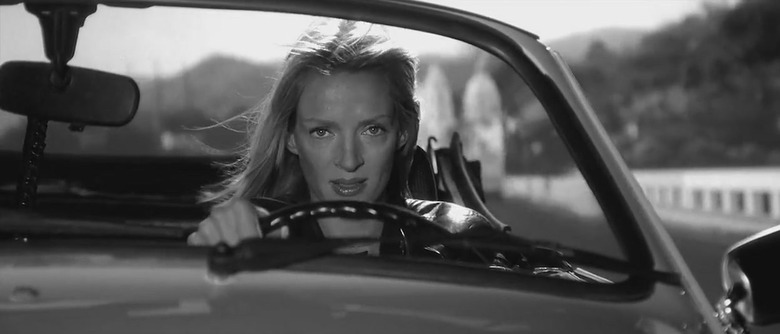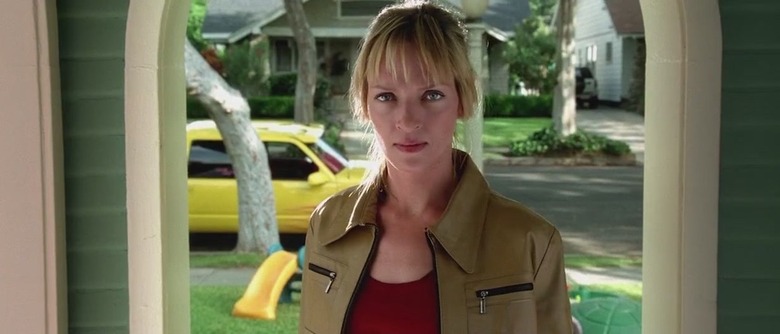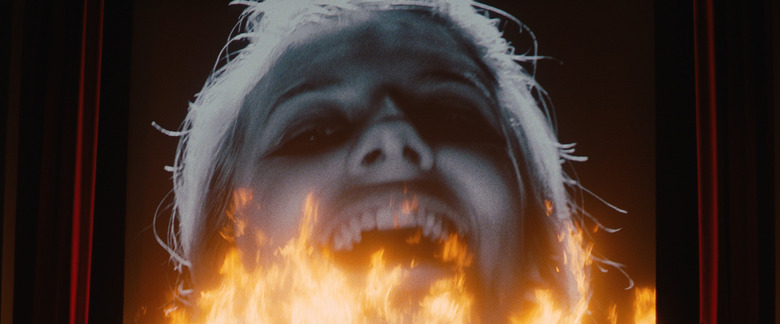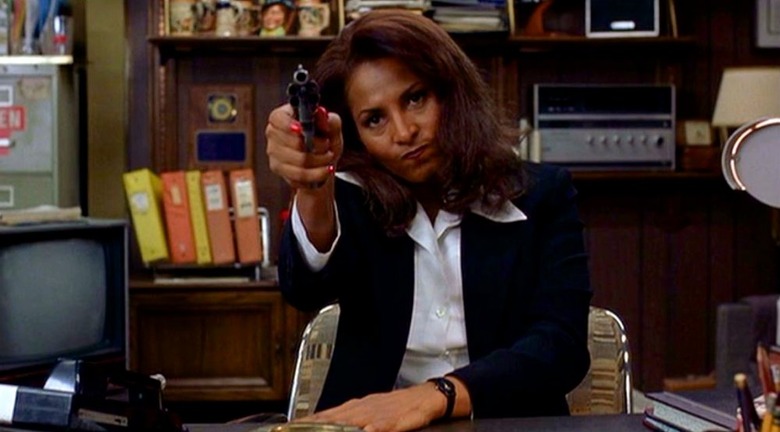The Powerful Women Of Quentin Tarantino: How The Bride, Shoshanna And More Helped Save My Life
(Welcome to The Soapbox, the space where we get loud, feisty, political, and opinionated about anything and everything. In this edition: Quentin Tarantino is many things...including a writer of amazing female characters.)Director Quentin Tarantino recently came under scrutiny for refusing to answer a female journalist's question about the number of lines he wrote for Margot Robbie in his latest, Once Upon a Time in Hollywood. He "rejected [her] hypothesis" that he neglected to write enough for Robbie's part. Robbie defended the decision, saying that she enjoyed working within the restraints of a low-dialogue role.While Tarantino is by no means perfect, it feels disingenuous to call him out on a lack of dialogue for Robbie when he has written some of the more complex and powerful female characters in American cinema. The performers entrusted with these characters brought them to life. They don't shy away from the more difficult aspects of their characterizations. Their flaws make them relatable, and ultimately more human.My own relationship with Tarantino's filmography is complicated. I cannot reconcile Tarantino endangering Uma Thurman on the set of Kill Bill: Volume 2. I worry about his knowledge of Weinstein's predation. I have serious concerns about how he treats people both on-set and off. Despite my conflicting feelings on the man himself, it's impossible to deny the impact his characters made on my life. By writing female characters who were flawed, traumatized, and stuck in dangerous hyper-masculine worlds, he gave me characters whose trajectories felt more like my own. Tarantino's women were survivors, and I was just learning how to be one.
The Blood-Splattered Bride
Kill Bill: Volume 1 came out in October of 2003. As I was still underage (I had just turned 16), I had to beg my mother to take me to see the latest Tarantino joint. I was obsessed with the director's filmography and had even painted a mural of Mia Wallace on my bedroom wall. After weeks of begging, my mother relented and took me to see the movie. We made it as far as Buck's death before she yanked me out of the seat and dragged me into another theater to see Intolerable Cruelty (to this day my least favorite Coen brothers' movie). Where she saw hideous violence, I saw catharsis. My trauma was still a secret, something I was deeply ashamed to share.Only witnessing the tragic backstory for the Bride's revenge left me uneasy, and I did everything in my power to see the rest of the film as soon as I could. I needed to know how the Bride dealt with both her sexual abuse by Buck and co., but also how she dealt with being hurt by the man she had loved and trusted, Bill.You see, six months before Kill Bill was released in theaters, I was in an abusive relationship with an older boy/man. I endured sexual and emotional abuse until he dumped me unceremoniously. He alienated me from our mutual friends. I had an identity crisis, because so much of my identity had been wrapped up in his.Beatrix "The Bride" Kiddo helped me find the strength to forge my own identity once more. When I finally saw her cut glorious swathes of red through O-Ren's henchmen, I felt like I was witnessing a metamorphosis. The Bride had transformed from a weakened coma patient into an angel of death. As she performed her ballet of blood, I felt hope. Not hope for revenge of my own but hope that I too could change. I could heal. I could come out on the other side even stronger than before.The first half of Beatrix's story taught me that my trauma would not define me. The second half taught me about compassion.
“I was your woman.”
In Kill Bill: Volume 1, the Bride goes on her roaring rampage of revenge. She kills two members of Bill's Deadly Viper squad, both of whom happen to be women. It's all quite cathartic, especially the respect between the Bride and fellow trauma survivor O-Ren Ishii. However, it sets things up for what I imagined would be true catharsis – the Bride finally killing Bill.I often fantasized about getting revenge on the man who hurt me. It was an easy way to turn my pain into rage, because rage was easier to bear. The Bride's rage mirrored my own. I tried to embody her in every way, because it felt like armor.Kill Bill: Volume 2 changed my perception and taught me about forgiveness and compassion. The final conversation between Beatrix and Bill was the closest I would ever get to sitting down and talking with my own abuser. There was still love between them, much like the lingering feelings I still had for my "first love". After being shot with a truth serum, Beatrix explains herself to Bill:
"Before that strip turned blue, I was a woman. I was your woman. I was a killer who killed for you. Before that strip turned blue, I would have jumped a motorcycle onto a speeding train... for you. But once that strip turned blue, I could no longer do any of those things. Not anymore. Because I was going to be a mother. Can you understand that?"
Before that strip turned blue, Beatrix's entire identity was wrapped up in being "Bill's woman". She was willing to kill, to do Michelle Yeoh-worthy stunts, to do anything for the man she had tied herself to. Motherhood changed that and forced her to think about who she was as both an individual and as protector of the child within her.I didn't have a pregnancy to shake my concepts of womanhood, but I was still figuring out what it meant to be a woman. Unfettered and unmoored, I tried to piece together what it meant to be a survivor and female. Could I be both vengeful and compassionate? How could I reconcile my rage and pain with my desire to be an empathetic person?While Beatrix defeats fellow femme fatale Elle Driver (Daryl Hannah) in a particularly gruesome way, Elle more than deserves it for poisoning their Kung Fu master, Pai Mei. When it comes time for Beatrix to kill Bill, she does it in a way that gives them both closure. She gives him a peaceful death, something their kind so rarely afforded. It's a moment of compassion, and one that proves the Bride is more than a heartless killing machine bent on revenge. She's her own woman. She's a mother. She's a fighter. She's capable of compassion and empathy despite her pain, which meant that I could be, too.
An Inglourious Basterd
Unfortunately, like many survivors of abuse, I sought out another deeply toxic relationship. The abuse was different this time, easier for me to reconcile in my teenage mind. My boyfriend was controlling, and it came to a head when we moved across the country together. I wasn't allowed to drive, and my boyfriend locked me in our room on more than one occasion when I threatened to leave. I managed to escape after three months by going on "vacation" to see my grandmother. I ended up going back to the East Coast with thousands of dollars in debt, one suitcase of my belongings, and a serious undiagnosed case of Post-Traumatic Stress Disorder. I was 20.While I would often reflect on the heroines I had idealized in rape-revenge cinema, including the Bride, their stories didn't feel quite like mine. During the time in which I was essentially a captive, I was forced to put on a mask to keep myself safe. I was put into terrifying situations against my will, and often had to put on a show of strength to keep from crumbling. I had used subterfuge to survive and then ran away – nothing about that felt powerful.In 2009, Tarantino released Inglourious Basterds. The film's protagonist, Shoshanna (Mélanie Laurent), reminded me of myself. I hadn't suffered nearly the tragedies she had, but I knew what it was like to feel trapped and alone. I knew the suffocating feeling of being surrounded by people who mean you harm and forcing a smile through necessity. If the Bride had endured one way, Shoshanna was an example of another way to exist.While Shoshanna's eventual revenge is glorious, the scene that struck me the hardest was a much quieter one. Hans Landa (Christoph Waltz) was the monster in Shoshanna's story, the Nazi officer who killed her family. Though Shoshanna is living under a new identity, she fears that Landa will recognize her. These anxieties are brought to a crescendo when Landa and her end up at the same table.While Waltz won an Oscar for his role, it's Laurent's performance that took my breath away. Shoshanna clearly knows how to play the role of a subservient woman, even if she's only playing the role to seek her revenge and survive in a hostile environment. I know what it's like to sit across the table from someone you fear or hate and be forced to smile, and that scene captured the feeling completely. To this day I can't watch Shoshanna's final preparations for her night of vengeance without getting tears in my eyes.
Alabama, Jackie, and a Cat named Zoe
While Beatrix Kiddo and Shoshanna are the characters I've felt most directly aligned with, Tarantino has written several other female characters that are delightfully complex. I would argue that the hero of the Tarantino-penned, Tony Scott-directed True Romance isn't Clarence Worley (Christian Slater), but rather his wife Alabama. She gets some of the biggest heroic moments in the film, including a knock-down, drag-out fight with James Gandolfini's hitman character. Clarence is clearly some kind of self-insert for Tarantino (he's a guy who works in a comic book shop obsessed with Kung Fu movies), but Alabama is a fully-fledged fierce female. While she falls into the "prostitute with a heart of gold" trope, her character choices throughout the film and portrayal by Patricia Arquette made her into something deeper.Jackie Brown is another Tarantino character that deserves mention, though I've never personally connected with her as deeply. While I think some of this is because I can never understand the racial inequalities she faces, I think it has more to do with her age and maturity in the film. She's a grown woman who behaves with a kind of wisdom I think most other Tarantino characters lack. Pam Grier brings a powerful kind of grace to Jackie – the kind I hope to one day be able to identify with. I imagine that as I get older and begin to mature myself, I will be able to see more of myself in this brilliant character.If there's a character I long to be, it's Death Proof's Zoe. She's not even so much a character as the fictional embodiment of the woman who portrays her, Zoe Bell. I've been following Bell's work since she was Thurman's stunt double on Kill Bill. I watched the documentary Double Dare on repeat, blown away by this incredible performer and stuntwoman. Whenever she gets knocked down, she bounces back up with a smile on her face and a spring in her step. It's incredible to see, and her fictional doppelganger has a similar attitude. After being chased down and nearly killed by Stuntman Mike (Kurt Russell), Zoe grabs a hunk of fence post, straddles the car door, and gets ready to wreak havoc.There is joy in the revenge of the Death Proof girls. Whereas Beatrix's revenge is bittersweet and Shoshanna's is ultimately overshadowed by the work of the Basterds, Kim, Abernathy, and Zoe have a blast hunting down their attacker. Stuntman Mike whines like a wounded infant after he's shot. It's hilarious to see the tough guy cry, especially given Zoe's complete nonchalance after being thrown from the hood of a car into a ditch. The ending sequence, in which the women beat Mike to a pulp before Zoe knocks him to the ground with a roundhouse kick to the face, is nothing short of glorious.
A Difficult Director Worth Discussing
While I don't believe that Tarantino's treatment of women in his films is proof of anything beyond his love of exploitation cinema, which often features fierce females, I do think the characters and their portrayals are worth discussing. He has written many powerful and complicated female characters, brought to life by talented performers who imbued them with their own experiences.No matter what gets said offscreen, Tarantino wrote characters that helped me draw strength when I didn't know I had any left to draw from. Through their experiences, I was able to develop my own path forward as a survivor. Regardless of your thoughts on Tarantino's feminism or who he is as a person, his films changed my life. And that is always worth discussing.





